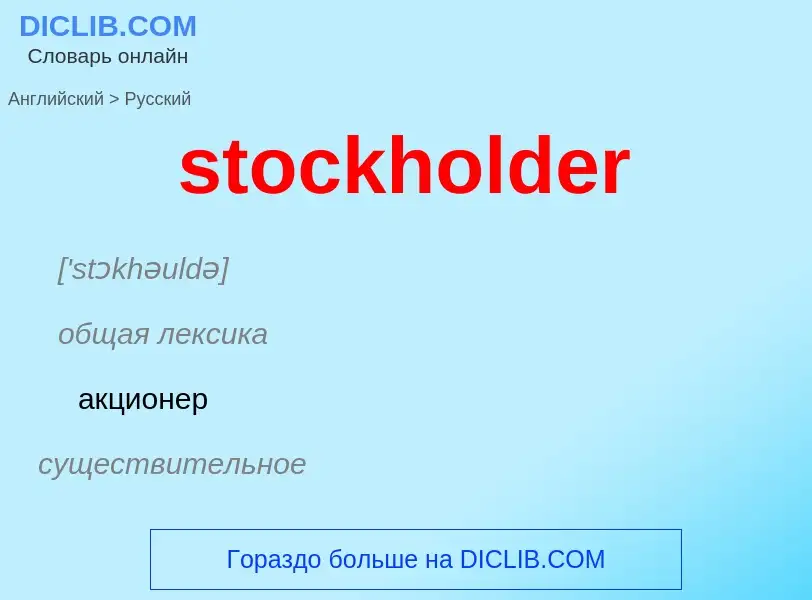Tradução e análise de palavras por inteligência artificial ChatGPT
Nesta página você pode obter uma análise detalhada de uma palavra ou frase, produzida usando a melhor tecnologia de inteligência artificial até o momento:
- como a palavra é usada
- frequência de uso
- é usado com mais frequência na fala oral ou escrita
- opções de tradução de palavras
- exemplos de uso (várias frases com tradução)
- etimologia
stockholder - tradução para russo
['stɔkhəuldə]
общая лексика
акционер
существительное
общая лексика
владелец акций
американизм
акционер
держатель акции [акций] (юридическое или физическое лицо, являющееся собственником акций акционерного общества, т. е. части акционерного капитала)
Великобритания
(владелец государственных ценных бумаг)
экономика
владелец запасов (лицо, имеющее запасы сырья, материалов, полуфабрикатов и т. п., предназначенных для перепродажи или дальнейшей переработки)
сельское хозяйство
скотовладелец
владелец животноводческого [скотоводческого, птицеводческого] хозяйства
синоним
Смотрите также
- stockholders of record
- stockholder of semifinished products
- beneficial stockholder
- majority stockholders
- principal stockholder
Definição
)
Wikipédia
A shareholder (in the United States often referred to as stockholder) of corporate stock refers to an individual or legal entity (such as another corporation, a body politic, a trust or partnership) that is registered by the corporation as the legal owner of shares of the share capital of a public or private corporation. Shareholders may be referred to as members of a corporation. A person or legal entity becomes a shareholder in a corporation when their name and other details are entered in the corporation's register of shareholders or members, and unless required by law the corporation is not required or permitted to enquire as to the beneficial ownership of the shares. A corporation generally cannot own shares of itself.
The influence of shareholders on the business is determined by the shareholding percentage owned. Shareholders of corporations are legally separate from the corporation itself. They are generally not liable for the corporation's debts, and the shareholders' liability for company debts is said to be limited to the unpaid share price unless a shareholder has offered guarantees. The corporation is not required to record the beneficial ownership of a shareholding, only the owner as recorded on the register. When more than one person is on the record as owners of a shareholding, the first one on the record is taken to control the shareholding, and all correspondence and communication by the company will be with that person.
Shareholders may have acquired their shares in the primary market by subscribing to the IPOs and thus provided capital to the corporation. However, most shareholders acquire shares in the secondary market and provided no capital directly to the corporation. Shareholders may be granted special privileges depending on a share class. The board of directors of a corporation generally governs a corporation for the benefit of shareholders.
Shareholders are considered by some to be a subset of stakeholders, which may include anyone who has a direct or indirect interest in the business entity. For example, employees, suppliers, customers, the community, etc., are typically considered stakeholders because they contribute value or are impacted by the corporation.

